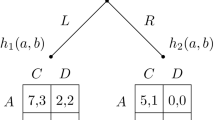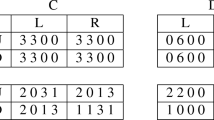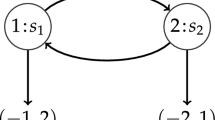Abstract
In this paper I analyze a repeated coordination game between a bounded memory player and a fully rational player. A bounded memory player is a player who is subject to imperfect recall, but, conditional on this constraint, acts optimally every point in time given her beliefs over the actual history of the game. I show that the results contrast with the ones in the finite automata literature. In particular, a result denoted the “tyranny of the weak” in Gilboa and Samet (Games Econ Behav 1: 213–221, 1989) is no longer present here.

Similar content being viewed by others
Notes
Therefore, in a dynamic game with players restricted to automata, the relevant solution concept is Nash Equilibrium (Rubinstein 1986, for example). Exceptions in the automata literature are Rubinstein (1986) and Kalai and Neme (1992), that study automata models with a perfection requirement. In this paper I will argue for consistent beliefs, which is different than the solution concept of the papers cited above.
In fact, an equilibrium with automata may differ from one with a bounded memory player even in a single player game with discounting. Think of an impatient bounded memory decision maker. Ex-ante, this player will design a strategy to achieve a higher payoff in the initial periods. As the game starts, the player might think that he is not in the initial periods and will take in consideration the payoffs of future periods. This distorts the incentives between the planning stage and the periods in which the game has already started. An automaton would allow an individual to commit to actions and avoid the ‘temptations’ to deviate that his future selves would confront. Wilson (2003) shows that with an exogenous stopping probability (but no discount factor) the result that the ex-ante optimal strategy is incentive compatible is restored. The intuition is that payoffs and beliefs are now “discounted” in the same way.
If \(\delta \le \frac{1}{2}\), there is another subgame perfect Nash equilibrium, in which player I chooses \(B\) and player II’s strategy is to choose \(R\) in the initial period and \(L\) if \(T\) has been played or \(R\) if \(B\) has been played.
Note that in the reputation literature a player may benefit if his opponent believes that, with positive probability, he is a commitment type. Although the intuition of the tyranny of the weak may be similar to the one in the reputation literature, the mechanism through which the ‘weak’ player benefits in the game is very different, as was noted by Gilboa and Samet (1989).
References
Aumann R, Hart S, Perry M (1997) The absent-minded driver. Games Econ Behav 20:102–116
Aumann R (1997) Rationality and bounded rationality. Games Econ Behav 21:2–14
Gilboa I (1997) A comment on the absent minded driver’s paradox. Games Econ Behav 20:2530
Gilboa I, Samet D (1989) Bounded versus unbounded rationality: the tyranny of the weak. Games Econ Behav 1:213–221
Kalai E, Neme A (1992) The strength of a little perfection. Int J Game Theory 20:335–355
Lipman B (1997) More absentmindedness. Games Econ Behav 20:97–101
Monte D (2007) Reputation and bounded memory in repeated games with incomplete information. Ph.D. Dissertation, Yale University
Piccione M, Rubinstein A (1997) On the interpretation of decision problems with imperfect recall. Games Econ Behav 20(1):3–24
Rubinstein A (1986) Finite automata play the repeated prisoners’ dilemma. J Econ Theory 39:83–96
Rubinstein A (1998) Modeling bounded rationality, Zeuthen lecture book series. MIT Press, Cambridge, MA
Sobel J (1985) A theory of credibility. Rev Econ Stud LII 557–573
Wilson A (2003) Bounded memory and biases in information processing. Job market paper, Princeton University
Acknowledgments
I thank Ben Polak for many conversations on the topic and Bernardo Guimaraes for helpful comments.
Author information
Authors and Affiliations
Corresponding author
Rights and permissions
About this article
Cite this article
Monte, D. Incentive constraints in games with bounded memory. Int J Game Theory 43, 137–143 (2014). https://doi.org/10.1007/s00182-013-0376-8
Accepted:
Published:
Issue Date:
DOI: https://doi.org/10.1007/s00182-013-0376-8




